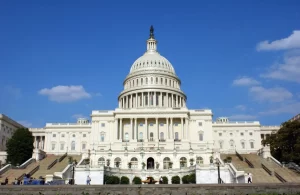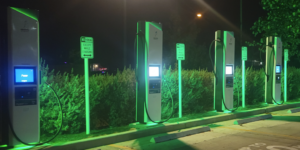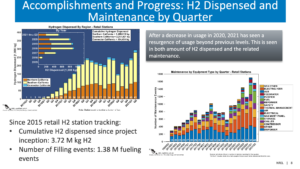Entrepreneurs and researchers are teaming up to perfect a new type of glass recycling that tackles coastal erosion, one of the most pressing issues on the Gulf Coast. Sand made from crushed bottles is helping defend against sea level rise by providing new habitats for plants that help fight sea level rise, land loss, and the impacts of climate change.
Gas exports are big business, but activists say the cost to their communities is too high.
The gas industry’s quest for profits is running into resistance from people in the path of new fossil fuel projects. Proposed liquefied natural gas, or LNG, terminals that send U.S. methane to other countries are invigorating activists across the country — including one former oil and gas worker fighting the industry’s plans in his backyard on the Louisiana Gulf Coast.
[embedded content]
Facing Down the Fossils: Rise Up
The gas industry’s quest for profit is running into resistance from people in the path of new fossil fuel projects. Proposals for liquefied natural gas (LNG) terminals that send U.S. methane to other countries are igniting activism across the country. One former oil-and-gas worker is fighting the industry’s plans from his backyard on the Louisiana Gulf Coast.
“Facing Down the Fossils” is a series about the people who are dealing with generational consequences of the pollution and economic damage caused by the fossil fuel industry and who now face the prospect of even more fossil fuel projects in the United States. In response, these communities are not only standing up to wrongdoing but also leading the effort to advance clean energy production. The project takes viewers to these communities to hear from the people who have dedicated themselves to fighting injustice in opposition to governments and multinational organizations. In the process, the episodes reveal what has been lost, what can be saved, and what might be gained in these vibrant neighborhoods, communities, and ecosystems.
This is the first episode of the four-part “Facing Down the Fossils” series, a co-production of Nexus Media News and Peril and Promise, a public media initiative from The WNET Group.
Republished from Nexus Media News, an editorially independent, nonprofit news service covering climate change.
The startup Glass Half Full is destroying old bottles to create new land along the U.S. Gulf Coast.
Entrepreneurs and researchers are teaming up to perfect a new type of glass recycling that tackles coastal erosion, one of the most pressing issues on the Gulf Coast. Sand made from crushed bottles is helping defend against sea level rise by providing new habitats for plants that help fight sea level rise, land loss, and the impacts of climate change.
[embedded content]
Facing Down the Fossils: Restore
Can discarded glass bottles be used to protect one of the country’s most endangered landscapes? A New Orleans startup is turning bottles into sand that can support new vegetation, prevent erosion, and restore lost land along the Gulf Coast. Researchers and entrepreneurs are working together on this unique solution to the combined effects of sea level rise, ecosystem damage, and climate change.
This is the second episode of the four-part “Facing Down the Fossils” series, a co-production of Nexus Media News and Peril and Promise, a public media initiative from The WNET Group.
Republished from Nexus Media News, an editorially independent, nonprofit news service covering climate change.
“The real critical infrastructure is the water, the air, the land, and the humanity.”
From the fracked landscape of the Permian Basin to the Gulf of Mexico, a youth-led journey puts a new focus on the fossil fuel industry. Visiting sacred sites and covering hundreds of miles, these runners are spreading the word and inspiring a movement to protect land, strengthen traditions, and protect future generations from the harmful impacts of extractive industries.
[embedded content]
Facing Down the Fossils: Resist
Drawing on an Indigenous tradition of running to share news and spread messages, a youth-led journey on foot across Texas is taking on the fossil fuel industry. From the Permian Basin to the Gulf of Mexico, this display of cross-tribal solidarity is building a new movement to honor sacred sites, protect the Earth, preserve an endangered way of life, and secure a better future.
This is the third episode of the four-part “Facing Down the Fossils” series, a co-production of Nexus Media News and Peril and Promise, a public media initiative from The WNET Group.
Republished from Nexus Media News, an editorially independent, nonprofit news service covering climate change.
How community-led microgrids can help New Orleans recover from major natural disasters
In New Orleans, hurricanes threaten more than lives and property; they also endanger the culture and creativity that make the city unique and drive its economy. Feed the Second Line’s Get Lit Stay Lit program is protecting the soul and fabric of the city with community solar microgrids. It’s a creative solution to a perennial problem along the U.S. Gulf Coast, providing lessons for the rest of the country to follow.
[embedded content]
What do solar panels and battery-powered microgrids have to do with protecting the unique culture of New Orleans? Meet the local organization turning restaurants into disaster recovery centers using community solar microgrids — and charting a way forward for a just energy transition in the American South. “Facing Down the Fossils” is a series about the people who are dealing with generational consequences of the pollution and economic damage caused by the fossil fuel industry and who now face the prospect of even more fossil fuel projects in the United States. In response, these communities are not only standing up to wrongdoing but also leading the effort to advance clean energy production. The project takes viewers to these communities to hear from the people who have dedicated themselves to fighting injustice in opposition to governments and multinational organizations. In the process, the episodes reveal what has been lost, what can be saved, and what might be gained in these vibrant neighborhoods, communities, and ecosystems.
This is the final episode of the four-part “Facing Down the Fossils” series, a co-production of Nexus Media News and Peril and Promise, a public media initiative from The WNET Group.
Republished from Nexus Media News, an editorially independent, nonprofit news service covering climate change.
Sign up for daily news updates from CleanTechnica on email. Or follow us on Google News!
Have a tip for CleanTechnica, want to advertise, or want to suggest a guest for our CleanTech Talk podcast? Contact us here.
Former Tesla Battery Expert Leading Lyten Into New Lithium-Sulfur Battery Era — Podcast:
I don’t like paywalls. You don’t like paywalls. Who likes paywalls? Here at CleanTechnica, we implemented a limited paywall for a while, but it always felt wrong — and it was always tough to decide what we should put behind there. In theory, your most exclusive and best content goes behind a paywall. But then fewer people read it! We just don’t like paywalls, and so we’ve decided to ditch ours. Unfortunately, the media business is still a tough, cut-throat business with tiny margins. It’s a never-ending Olympic challenge to stay above water or even perhaps — gasp — grow. So …
Advertisement
- SEO Powered Content & PR Distribution. Get Amplified Today.
- EVM Finance. Unified Interface for Decentralized Finance. Access Here.
- Quantum Media Group. IR/PR Amplified. Access Here.
- PlatoAiStream. Web3 Data Intelligence. Knowledge Amplified. Access Here.
- Source: https://cleantechnica.com/2023/06/21/facing-down-the-fossils-4-part-video-series/
- :has
- :is
- :not
- $UP
- 1
- 9
- a
- About
- above
- across
- Activism
- activists
- advance
- Advertise
- against
- AIR
- along
- also
- always
- American
- an
- and
- ARE
- At
- battery
- BE
- been
- behind
- BEST
- Better
- Big
- Bit
- Building
- business
- but
- by
- CAN
- caused
- Centers
- challenge
- change
- charting
- chip
- City
- clean energy
- cleantech
- Cleantech Talk
- Climate
- Climate change
- Coast
- combined
- Communities
- community
- community-led
- Consequences
- content
- Cost
- countries
- country
- country’s
- covering
- create
- Creative
- creativity
- critical
- Critical Infrastructure
- Culture
- damage
- dealing
- decide
- decided
- dedicated
- disaster
- Display
- do
- don
- down
- drive
- earth
- Economic
- economic damage
- economy
- ecosystem
- Ecosystems
- effects
- effort
- embedded
- energy
- entrepreneurs
- episode
- Episodes
- Era
- Even
- Exclusive
- expert
- exports
- fabric
- Face
- facing
- fewer
- fight
- fighting
- final
- First
- Focus
- follow
- Foot
- For
- Former
- Forward
- fossil
- Fossil fuel
- Fossils
- from
- Fuel
- full
- future
- gained
- GAS
- generational
- generations
- get
- glass
- Goes
- Governments
- Group
- Grow
- Guest
- Half
- harmful
- Have
- hear
- help
- helping
- here
- High
- his
- HTTPS
- Humanity
- Hundreds
- if
- igniting
- Impacts
- implemented
- in
- Including
- independent
- industries
- industry
- industry’s
- Infrastructure
- Initiative
- injustice
- inspiring
- into
- issues
- IT
- ITS
- journey
- jpg
- just
- Land
- landscape
- leading
- Lessons
- Level
- Life
- like
- Limited
- Lives
- lng
- local
- loss
- lost
- Louisiana
- made
- major
- make
- margins
- Media
- Meet
- messages
- methane
- Mexico
- might
- monthly
- more
- most
- movement
- multinational
- Natural
- Natural Gas
- New
- New Orleans
- news
- nexus
- Nonprofit
- now
- of
- Oil
- Oil and Gas
- Old
- Olympic
- on
- ONE
- only
- opposition
- or
- organization
- organizations
- Other
- our
- panels
- path
- Patreon
- PayPal
- People
- perfect
- perhaps
- plans
- plants
- plato
- Plato Data Intelligence
- PlatoData
- player
- please
- podcast
- Pollution
- pressing
- prevent
- Problem
- process
- Production
- Profit
- profits
- Program
- project
- projects
- promise
- property
- Proposals
- proposed
- prospect
- protect
- protecting
- providing
- public
- put
- Puts
- quest
- Read
- real
- Recover
- recovery
- recycling
- researchers
- Resistance
- response
- REST
- Restaurants
- restore
- reveal
- Rise
- running
- s
- SAND
- say
- SEA
- Sea level
- Second
- secure
- send
- Series
- service
- Share
- should
- Sites
- So
- solar
- solar panels
- solution
- Soul
- South
- spread
- Spreading
- startup
- States
- stay
- Still
- Strengthen
- suggest
- support
- Tackles
- takes
- taking
- Talk
- team
- teaming up
- Tesla
- texas
- than
- that
- The
- their
- themselves
- then
- theory
- There.
- These
- they
- Third
- this
- threaten
- tip
- to
- together
- too
- tough
- tradition
- transition
- Turning
- type
- u.s.
- unique
- United
- United States
- Updates
- us
- used
- using
- Ve
- via
- vibrant
- Video
- viewers
- want
- was
- Water
- Way..
- we
- What
- while
- WHO
- with
- Word
- worker
- working
- Wrong
- you
- Your
- youtube
- zephyrnet







